The term gets tossed around a lot, but the meaning and consequences of a "currency war" aren't intuitively clear to most people. Especially confusing is the idea that you lose the war when your currency goes up. The suddenly very strong dollar, for instance, should, one would think, be a good thing, since it seems to imply that the rest of the world is impressed enough to covet our currency.
That's true in a sense, but in another sense -- and beyond a certain point -- it becomes a potentially huge problem, because a strong currency makes exports (priced in dollars) more expensive and therefore a tougher sell. Consider today's headlines:
Commodities rout slows Caterpillar
CHICAGO (Reuters) - Caterpillar Inc on Tuesday reported lower quarterly net profit that missed expectations as lower prices for copper, coal and iron ore hurt mining equipment orders, and warned the recent fall in oil prices would make for a difficult year in 2015. The report sent the company's shares down nearly 6 percent in premarket trading.
Plunging profits have sent shares of Microsoft tumbling
Microsoft shares slid more than 7.6% in pre-market trading after second-quarter earnings showing a dip in earnings. Microsoft reported earnings per share of 71 cents, meeting estimates but falling below the 78 cents reported during the same quarter last year.
Procter & Gamble Profit Down 31%, Hurt by Exchange Rates
Procter & Gamble's second-quarter earnings sank 31 percent as the strong U.S. dollar cut into the performance of the world's largest consumer products maker.
The Cincinnati company, which sells products ranging from Tide detergent to Crest toothpaste, said Tuesday that exchange rates will remain a challenge well into fiscal 2015, especially in the second half of its year. Overall, it expects foreign exchange to chop its core, fiscal 2015 earnings by 12 percent and reduce its revenue by 5 percent.
And why should we care about falling corporate profits?
Wall Street tumbles with Microsoft, Caterpillar; data weighs
NEW YORK (Reuters) - U.S. stocks fell sharply on Tuesday, with Microsoft and Caterpillar shares tumbling after quarterly results, while an unexpected decline in durable goods orders also weighed on sentiment.
Many multinational companies have posted disappointing results and forecasts, with the stronger dollar a common culprit.
Adding to earnings concerns, a gauge of U.S. business investment plans unexpectedly fell in December, a potential sign that slowing global growth and falling crude oil prices were starting to have an impact on the economy.
So this is what it means to lose a currency war: plunging corporate profits, falling stock prices, a slowing economy, rising layoffs. Then, when the reality of a weaker economy reaches Main Street, angry voters, difficult elections, and regime change. This last part is of course unacceptable to the people managing economic policy and is why virtually no one can accept defeat in such a conflict.
So...a few more days like this and expect a parade of Fed, Treasury and congressional talking heads to float the idea of cancelling those promised interest rate hikes and, just maybe, returning into the good old days of QE Infinity.















